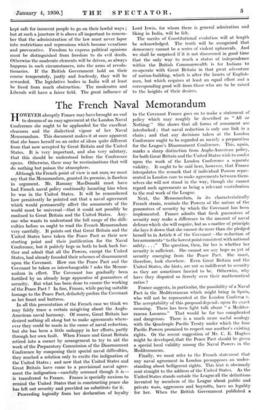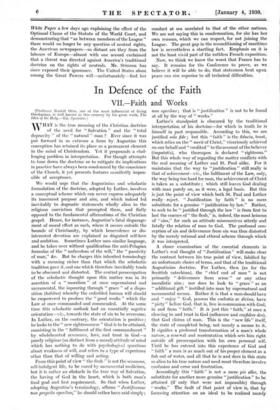The French Naval Memorandum T_TOVVEVER abruptly France may have brought
an end to dreams of an easy agreement at the London Naval Conference she ought to be applauded. for the excellent clearness and the dialectical vigour of her Naval Memorandum. This document makes it at once apparent that she bases herself on an order of ideas quite different from that now accepted by Great Britain and the United States. It is very important, and also very salutary, that this should be understood before the Conference opens. Otherwise, there may be recriminations that will do nothing but poison the atmosphere.
Although the French point of view is not ours, we must say that the Memorandum, granted its premise, is flawless in argument. Mr. Ramsay MacDonald must have had French naval policy continually haunting him when he was in the United States. It will be remembered how persistently he pointed out that a naval agreement which would permanently affect the armaments of the world must be universal—that it could not possibly be confined to Great Britain and the United States. Any- one who wants to understand the full range of the diffi- culties before us ought to read the French Memorandum very carefully. It points out that Great Britain and the United States have taken the Peace Pact as their new starting point and their justification for the Naval Conference, but it politely begs us both to look back fur- ther and admit that all the Powers, except the United States, had already founded their schemes of disarmament upon the Covenant. How can the Peace Pact and the Covenant be taken as interchangeable ? asks the Memor- andum in effect. The Covenant has gradually been fortified by an already large apparatus of guarantees of security. But what has been done to ensure the working of the Peace Pact ? In fine, France, while paying suitable homage to the Peace Pact, definitely prefers the Covenant as her fount and buttress.
In all this presentation of the French case we think we may fairly trace a certain misgiving about the Anglo- American naval harmony. Of course, Great Britain has desired nothing all along but to make agreements where- ever they could be made in the cause of naval reduction, but she has been a little unhappy in her efforts, partly through her own fault. When France and Great Britain retired into a corner by arrangement to try to aid the work of the Preparatory Commission of the Disarmament Conference by composing their special naval difficulties, they reached a solution only to excite the indignation of the United States ; and now that the United States and Great Britain have come to a provisional naval agree- ment the indignation—carefully screened though it is— is transferred to France. France is specially anxious to remind the United States that in constructing peace she has left out security and provided no substitute for it.
Proceeding logically from her declaration of loyalty to the Covenant France goes on to make a statement of policy which may roughly be described as "All or Nothing." She shows that all forms of armament are interlocked ; that • naval reduction is only one link in a chain ; and that any decisions taken at the London Conference ought to be regarded as merely a preparation for the League's Disarmament Conference. This, again, marks a sharp distinction from Anglo-American policy, for both Great Britain and the United States wish to confer upon the work of the London Conference a separate validity. It ought to be said here, however, that France interpolates the remark that if individual Powers repre- sented in London care to make agreements between them- selves she will not stand in the way, though she cannot regard such agreements as being a relevant contribution to the real work of the League.
Next, the Memorandum, in its characteristically French strain, reminds the Powers of the nature of the guarantees of security by which the Covenant has been implemented. France admits that fresh guarantees of security may make a difference to the amount of naval defence which she will require, but as a matter of principle she lays it down that she cannot do more than she pledged herself to in Article 8 of the Covenant—the reduction of her armaments "to the lowest point consistent with national safety. . . ." The question, then, for her is whether her security is sufficient. She cannot see any hope as yet of security emerging from the Peace Pact. She must, therefore, look elsewhere. Even Great Britain and the United States, she hints, are not so indifferent to security as they are sometimes fancied to be. Otherwise, why have they disputed so fiercely over their mathematical ratios ?
France suggests, in particular, the possibility of a Naval Pact in the Mediterranean which might bring in Spain, who will not be represented at the London Conferrsc e.
The acceptability of this proposal depends upon its exact meaning. There has been light talk about "a Mediter- ranean Locarno." That would be far too complicated and dangerous. There is a much more useful analogy with the Quadruple Pacific Treaty under which the four Pacific Powers promised to respect one another's existing rights. Or the recent suggestion of Mr. C. E. Hughes might be developed, that the Peace Pact should be given a special local validity among the Naval Powers in the Mediterranean.
Finally, we must refer to the French statement that any naval agreement in London presupposes an under- standing about belligerent rights. This hint is obviously sent straight to the address of the United States. As the United States stands outside the League all the definitions invented by members of the League about public and private wars, aggressors and boycotts, have no legality for her. When the British Government published a White Paper a few days ago explaining the effect of the Optional Clause of the Statute of the World Court, and demonstrating that "as between members of the League" there would no longer be any question of neutral rights, the American newspapers—so distant are they from the labours of Europe—almost with one accord exclaimed - that a threat was directed against America's traditional doctrine on the rights of neutrals. Mr. Stimson has since exposed their ignorance. The United States alone among the Great Powers will—unfortunately—find her conduct at sea unrelated to that of the other nations.. We are not saying this in condemnation, for she has her own reasons, which we can respect, for not joining the League. The great gap in the reconditioning of maritime. law is nevertheless a startling fact. Emphasis on it is- not the least vivid part of the ruthless French exposition.- Now, we think we know the worst that France has to say. It remains for the Conference to prove, as we believe it will be able to do, that statesmen bent upon peace can rise superior to all technical difficulties.











































 Previous page
Previous page